Unit 4 Why don't you talk to your parents? grammar focus语法课件 人教版八年级英语下册
文档属性
| 名称 | Unit 4 Why don't you talk to your parents? grammar focus语法课件 人教版八年级英语下册 |

|
|
| 格式 | pptx | ||
| 文件大小 | 1011.9KB | ||
| 资源类型 | 试卷 | ||
| 版本资源 | 人教新目标(Go for it)版 | ||
| 科目 | 英语 | ||
| 更新时间 | 2025-04-11 18:53:15 | ||
图片预览

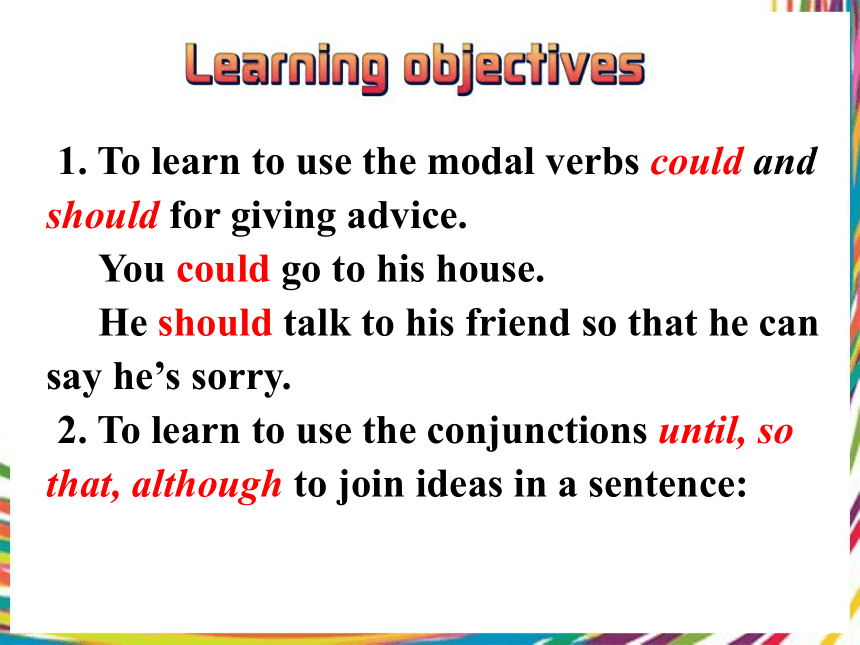
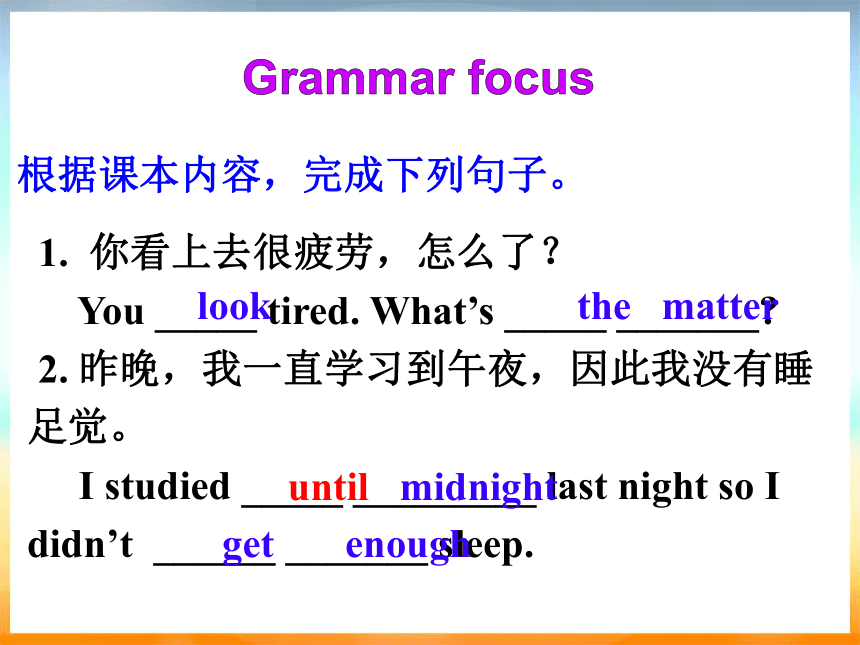
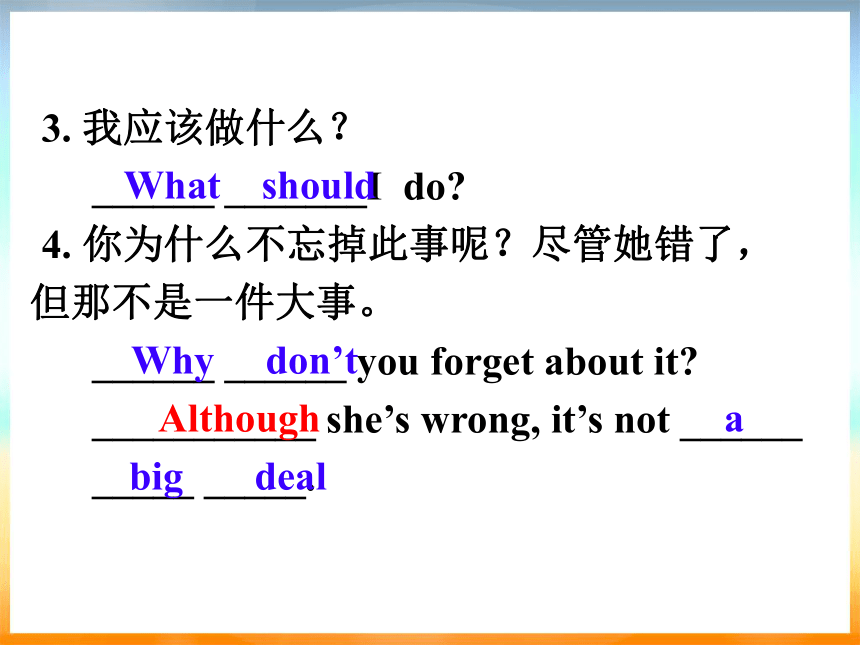
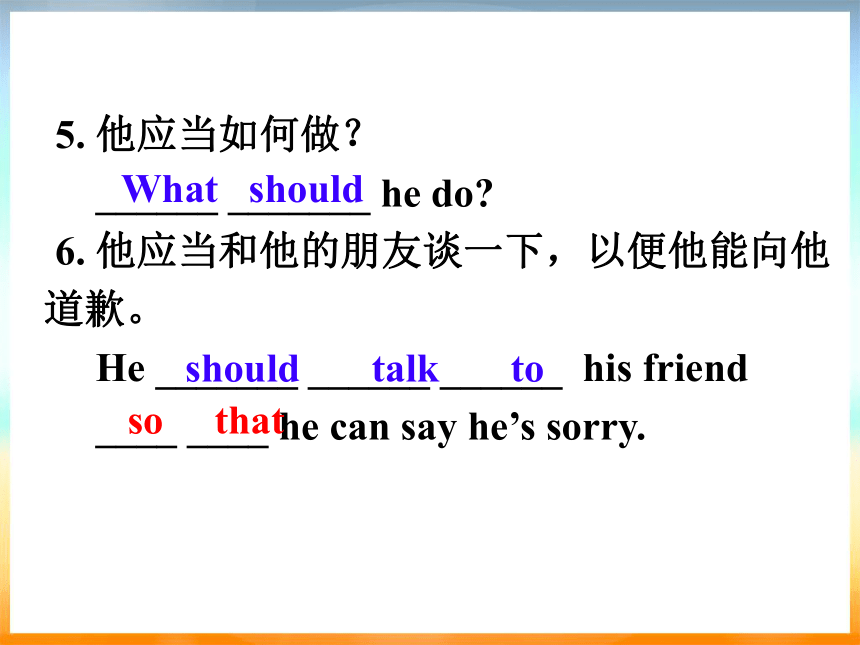
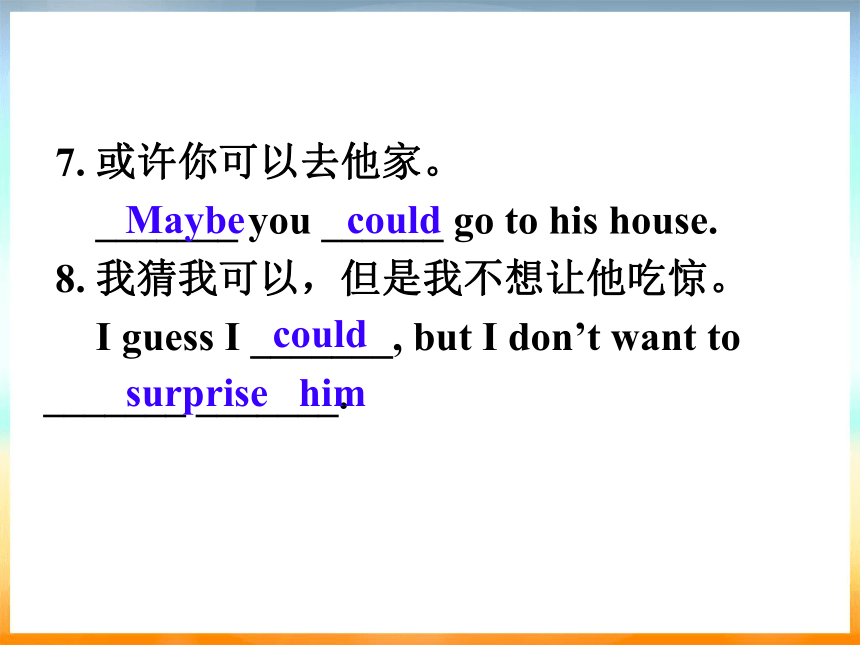
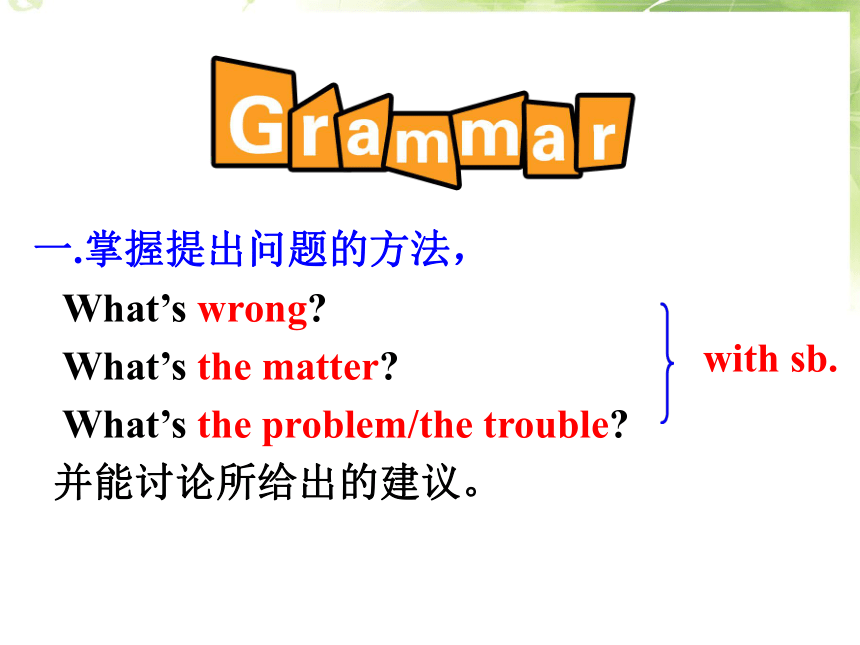
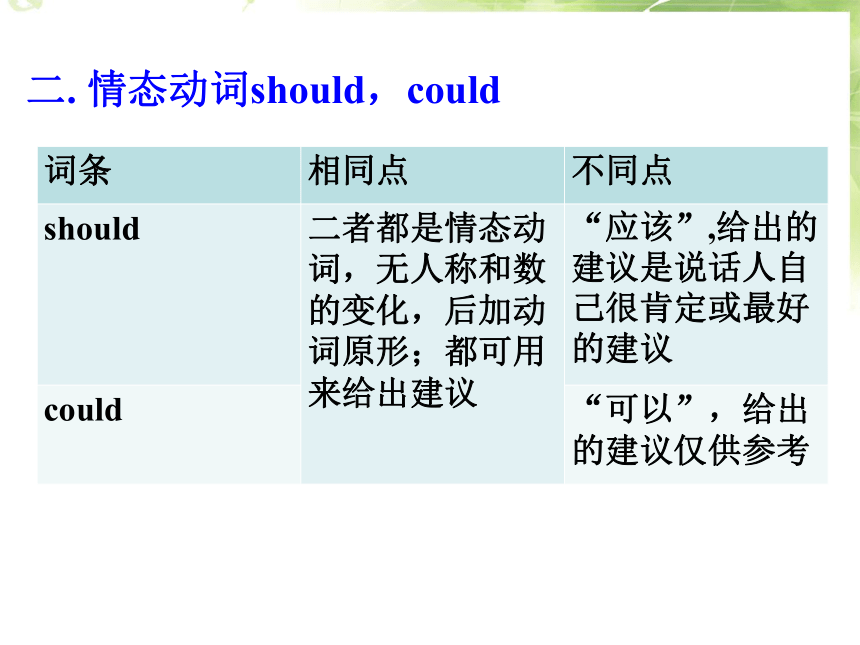
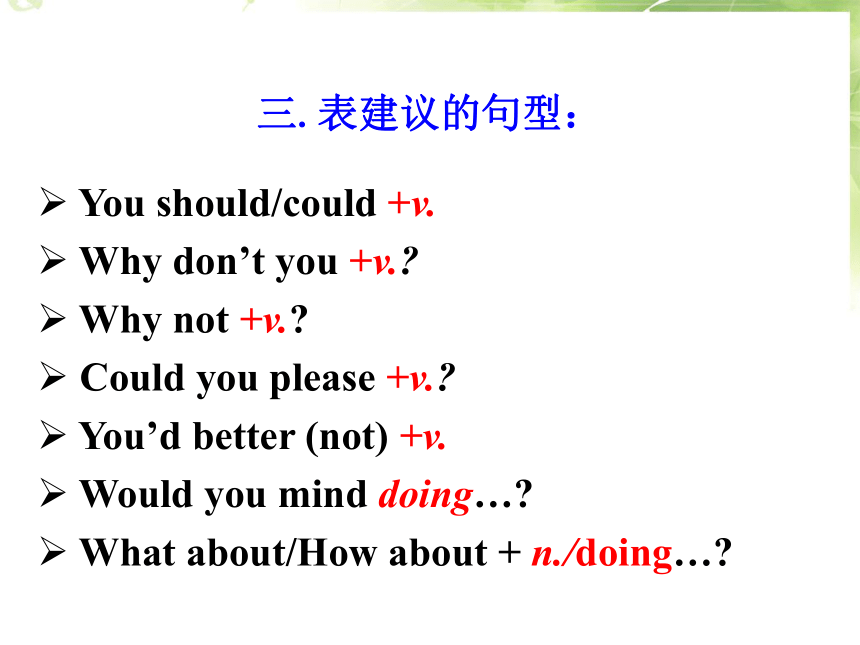
文档简介
(共29张PPT)
Unit 4
Why don’t you talk to your parents
1. To learn to use the modal verbs could and should for giving advice.
You could go to his house.
He should talk to his friend so that he can say he’s sorry.
2. To learn to use the conjunctions until, so that, although to join ideas in a sentence:
根据课本内容,完成下列句子。
1. 你看上去很疲劳,怎么了?
You _____ tired. What’s _____ _______
2. 昨晚,我一直学习到午夜,因此我没有睡足觉。
I studied _____ _________ last night so I didn’t ______ _______ sleep.
Grammar focus
until midnight
look the matter
get enough
3. 我应该做什么?
______ _______I do
4. 你为什么不忘掉此事呢?尽管她错了, 但那不是一件大事。
______ ______ you forget about it
___________ she’s wrong, it’s not ______
_____ _____.
What should
Why don’t
Although
big deal
a
5. 他应当如何做?
______ _______ he do
6. 他应当和他的朋友谈一下,以便他能向他道歉。
He _______ ______ ______ his friend
____ ____ he can say he’s sorry.
What should
should talk to
so that
7. 或许你可以去他家。
_______ you ______ go to his house.
8. 我猜我可以,但是我不想让他吃惊。
I guess I _______, but I don’t want to _______ _______.
Maybe could
could
surprise him
一.掌握提出问题的方法,
What’s wrong
What’s the matter
What’s the problem/the trouble
并能讨论所给出的建议。
with sb.
二. 情态动词should,could
词条 相同点 不同点
should 二者都是情态动词,无人称和数的变化,后加动词原形;都可用来给出建议 “应该”,给出的建议是说话人自己很肯定或最好的建议
could “可以”,给出的建议仅供参考
三.表建议的句型:
You should/could +v.
Why don’t you +v.
Why not +v.
Could you please +v.
You’d better (not) +v.
Would you mind doing…
What about/How about + n./doing…
1.until作连词,意为“直到”引导时间状语从句时需注意。
(1)主句是肯定句时,其谓语动词用延续性动词,强调主句的动作或状态一直持续到从句的动作发生时为止,译成“直到……为止”
(2)主句是否定句时,其谓语用非延续性动词,强调主句的动作在从句的动作发生之后才开始,其构成为 “not……until”,一般译为“直到……才”
四.until, so that,although引导的状语从句:
I’ll stay here until you come back.
我会呆在这里,直到你回来(为止)。
We can't get off the bus until it stops.
直到公共汽车停下来时,我们才下车。
2. so that 意为“为了,以便”,引导目的状语从句,表示前一句所表述的动作的目的,相当于 in order that,从句中多含有can /could / will / may/ should等情态动词。
【拓展】
so… that… 意为“如此……以至于”,常用于结果状语从句,表示上文动作所产生结果。
e.g. He was so weak that he could hardly
stand up.
他身体虚弱得几乎站不起来了。
e.g. I took a taxi so that I could get there earlier .
我搭了一辆出粗车,为了能早点到那儿。
Although / Though it is raining, but they are still playing outside.
→Although / Though it is raining, they are still playing outside. = It is raining, but they are still playing outside.
3.although是连词,意为“尽管;然而”,引导让步状语从句, 相当于though。
e.g. Although she is in poor health, she keeps on studying. 尽管她身体不好,但仍然继续学习。
它们引导的让步状语从句既可放在主句之前,也可放在主句之后。另外,在英语中although 或though不能和but同时出现在一个句子中,但它们之间可进行句型转换。如:
Although / Though the weather is sunny, I feel cold.
I feel cold although / though the weather is sunny.
(×)
(√ )
4a
Fill in the blanks with although, so that or until.
1. A: What’s wrong
B: My sister borrows my clothes without asking. What should I do
A: Well, you could tell her that this makes you angry _______ she’ll ask you next time.
so that
2. A: I don’t have any friends at my new school. What should I do
B: __________ you don’t have any now, you’ll soon make some.
Although
3. A: I’m worried about my school grades. What’s your advice
B: You shouldn’t wait _____ the last minute to study for a test.
until
4. A: Mike is my best friend, but he always copies my homework. What should I do
B: ________ he’s your best friend, you should still tell him that copying others’ homework is wrong.
Although
4b
Write one piece of advice for each problem. Then compare your advice with your partner’s and decide whether the advice is good or bad.
1. I’m very shy.
Advice:
_______________________________
_______________________________
Why don’t you join a club at school and make more friends
2. My sister and I fight all the time.
Advice:
_________________________________
_________________________________
_________________________________
You could try to do more fun things with her so that you will like each other better and not fight so often.
3. My sister spends all evening on the phone.
Advice:
___________________________________
___________________________________
___________________________________
You should explain that you don't mind her phoning all evening. However, she should let you give your friend a call.
4. My cousin borrows my things without
returning them.
Advice:
__________________________________
__________________________________
__________________________________
You could tell him that this makes you unhappy so that he will return them soon next time.
5. My parents won’t let me have a pet.
Advice:
___________________________________
___________________________________
___________________________________
Maybe they think you won’t look after the pet yourself. You should communicate with them.
Choose one of the problems and ask your classmates for advice. Decide which classmate has the best advice.
Problems
You left your homework at home.
Your best friend is more popular than you.
You are afraid of speaking in front of people.
Your best friend does not trust you any more.
You parents always argue.
4c
My best friend is more popular than me. I want to be like him. What should I do
You could try to be friendlier.
You should just be yourself.
What problems do you have
at school
too much homework
too many examinations
can’t get good grades
have to go to school early
have to wear the school uniform
too many rules to obey at school
at home
have to get up too early
have no enough money
have no time to watch TV
argument between parents
A: What’s the matter
B: …What should I do
A: Why don’t you…
Give advice to your partner’s problems and make conversations.
discuss with teachers to have fewer exams
try to do things quickly and go to bed early
try to spend less money
work harder at school
_____________________________
为某人 / 某事担忧
___________________ 直到……才……
___________________ 抄某人的作业
___________________ 害怕……
___________________ 以便
______________________ 在众人面前说话
not ... until ...
copy one’s homework
be afraid of ...
so that
speak in front of people
be worried about sb. / sth.
Ⅰ. 根据句意及括号内所给单词的提示填空。
1. After school you should ____________(communicate) with Bob.
2. He shouldn’t ________(copy) Alan’s homework.
3. You could ________(return) the book to him after finishing reading it.
communicate
copy
return
Ⅱ. 完成句子
1. 你为什么不休息几天呢?
____________________________ for a few days
2. 我们这周末去海滩吧。
____________________________ this weekend.
3. 给你的朋友打个电话道歉怎么样?
____________________________ your friend to say sorry
Why don’t you / Why not rest
Let’s go to the beach
What about / How about calling
4. 你可以面对面把那件事给他解释一下。
________________________________ face to face.
5. 她应该告诉父母她的问题。
________________________ her problems.
You could explain that thing to him
She should tell her parents
1.Use the structure below to make two dialogues.
A: hat’s wrong with you
B: _______________________. What should I do
A: you could/should…
2. Use until,so that and although to make sentences.
Unit 4
Why don’t you talk to your parents
1. To learn to use the modal verbs could and should for giving advice.
You could go to his house.
He should talk to his friend so that he can say he’s sorry.
2. To learn to use the conjunctions until, so that, although to join ideas in a sentence:
根据课本内容,完成下列句子。
1. 你看上去很疲劳,怎么了?
You _____ tired. What’s _____ _______
2. 昨晚,我一直学习到午夜,因此我没有睡足觉。
I studied _____ _________ last night so I didn’t ______ _______ sleep.
Grammar focus
until midnight
look the matter
get enough
3. 我应该做什么?
______ _______I do
4. 你为什么不忘掉此事呢?尽管她错了, 但那不是一件大事。
______ ______ you forget about it
___________ she’s wrong, it’s not ______
_____ _____.
What should
Why don’t
Although
big deal
a
5. 他应当如何做?
______ _______ he do
6. 他应当和他的朋友谈一下,以便他能向他道歉。
He _______ ______ ______ his friend
____ ____ he can say he’s sorry.
What should
should talk to
so that
7. 或许你可以去他家。
_______ you ______ go to his house.
8. 我猜我可以,但是我不想让他吃惊。
I guess I _______, but I don’t want to _______ _______.
Maybe could
could
surprise him
一.掌握提出问题的方法,
What’s wrong
What’s the matter
What’s the problem/the trouble
并能讨论所给出的建议。
with sb.
二. 情态动词should,could
词条 相同点 不同点
should 二者都是情态动词,无人称和数的变化,后加动词原形;都可用来给出建议 “应该”,给出的建议是说话人自己很肯定或最好的建议
could “可以”,给出的建议仅供参考
三.表建议的句型:
You should/could +v.
Why don’t you +v.
Why not +v.
Could you please +v.
You’d better (not) +v.
Would you mind doing…
What about/How about + n./doing…
1.until作连词,意为“直到”引导时间状语从句时需注意。
(1)主句是肯定句时,其谓语动词用延续性动词,强调主句的动作或状态一直持续到从句的动作发生时为止,译成“直到……为止”
(2)主句是否定句时,其谓语用非延续性动词,强调主句的动作在从句的动作发生之后才开始,其构成为 “not……until”,一般译为“直到……才”
四.until, so that,although引导的状语从句:
I’ll stay here until you come back.
我会呆在这里,直到你回来(为止)。
We can't get off the bus until it stops.
直到公共汽车停下来时,我们才下车。
2. so that 意为“为了,以便”,引导目的状语从句,表示前一句所表述的动作的目的,相当于 in order that,从句中多含有can /could / will / may/ should等情态动词。
【拓展】
so… that… 意为“如此……以至于”,常用于结果状语从句,表示上文动作所产生结果。
e.g. He was so weak that he could hardly
stand up.
他身体虚弱得几乎站不起来了。
e.g. I took a taxi so that I could get there earlier .
我搭了一辆出粗车,为了能早点到那儿。
Although / Though it is raining, but they are still playing outside.
→Although / Though it is raining, they are still playing outside. = It is raining, but they are still playing outside.
3.although是连词,意为“尽管;然而”,引导让步状语从句, 相当于though。
e.g. Although she is in poor health, she keeps on studying. 尽管她身体不好,但仍然继续学习。
它们引导的让步状语从句既可放在主句之前,也可放在主句之后。另外,在英语中although 或though不能和but同时出现在一个句子中,但它们之间可进行句型转换。如:
Although / Though the weather is sunny, I feel cold.
I feel cold although / though the weather is sunny.
(×)
(√ )
4a
Fill in the blanks with although, so that or until.
1. A: What’s wrong
B: My sister borrows my clothes without asking. What should I do
A: Well, you could tell her that this makes you angry _______ she’ll ask you next time.
so that
2. A: I don’t have any friends at my new school. What should I do
B: __________ you don’t have any now, you’ll soon make some.
Although
3. A: I’m worried about my school grades. What’s your advice
B: You shouldn’t wait _____ the last minute to study for a test.
until
4. A: Mike is my best friend, but he always copies my homework. What should I do
B: ________ he’s your best friend, you should still tell him that copying others’ homework is wrong.
Although
4b
Write one piece of advice for each problem. Then compare your advice with your partner’s and decide whether the advice is good or bad.
1. I’m very shy.
Advice:
_______________________________
_______________________________
Why don’t you join a club at school and make more friends
2. My sister and I fight all the time.
Advice:
_________________________________
_________________________________
_________________________________
You could try to do more fun things with her so that you will like each other better and not fight so often.
3. My sister spends all evening on the phone.
Advice:
___________________________________
___________________________________
___________________________________
You should explain that you don't mind her phoning all evening. However, she should let you give your friend a call.
4. My cousin borrows my things without
returning them.
Advice:
__________________________________
__________________________________
__________________________________
You could tell him that this makes you unhappy so that he will return them soon next time.
5. My parents won’t let me have a pet.
Advice:
___________________________________
___________________________________
___________________________________
Maybe they think you won’t look after the pet yourself. You should communicate with them.
Choose one of the problems and ask your classmates for advice. Decide which classmate has the best advice.
Problems
You left your homework at home.
Your best friend is more popular than you.
You are afraid of speaking in front of people.
Your best friend does not trust you any more.
You parents always argue.
4c
My best friend is more popular than me. I want to be like him. What should I do
You could try to be friendlier.
You should just be yourself.
What problems do you have
at school
too much homework
too many examinations
can’t get good grades
have to go to school early
have to wear the school uniform
too many rules to obey at school
at home
have to get up too early
have no enough money
have no time to watch TV
argument between parents
A: What’s the matter
B: …What should I do
A: Why don’t you…
Give advice to your partner’s problems and make conversations.
discuss with teachers to have fewer exams
try to do things quickly and go to bed early
try to spend less money
work harder at school
_____________________________
为某人 / 某事担忧
___________________ 直到……才……
___________________ 抄某人的作业
___________________ 害怕……
___________________ 以便
______________________ 在众人面前说话
not ... until ...
copy one’s homework
be afraid of ...
so that
speak in front of people
be worried about sb. / sth.
Ⅰ. 根据句意及括号内所给单词的提示填空。
1. After school you should ____________(communicate) with Bob.
2. He shouldn’t ________(copy) Alan’s homework.
3. You could ________(return) the book to him after finishing reading it.
communicate
copy
return
Ⅱ. 完成句子
1. 你为什么不休息几天呢?
____________________________ for a few days
2. 我们这周末去海滩吧。
____________________________ this weekend.
3. 给你的朋友打个电话道歉怎么样?
____________________________ your friend to say sorry
Why don’t you / Why not rest
Let’s go to the beach
What about / How about calling
4. 你可以面对面把那件事给他解释一下。
________________________________ face to face.
5. 她应该告诉父母她的问题。
________________________ her problems.
You could explain that thing to him
She should tell her parents
1.Use the structure below to make two dialogues.
A: hat’s wrong with you
B: _______________________. What should I do
A: you could/should…
2. Use until,so that and although to make sentences.
同课章节目录
- Unit 1 What's the matter?
- Section A
- Section B
- Unit 2 I'll help to clean up the city parks.
- Section A
- Section B
- Unit 3 Could you please clean your room?
- Section A
- Section B
- Unit 4 Why don't you talk to your parents?
- Section A
- Section B
- Unit 5 What were you doing when the rainstorm came
- Section A
- Section B
- Review of Units 1-5
- Unit 6 An old man tried to move the mountains.
- Section A
- Section B
- Unit 7 What's the highest mountain in the world?
- Section A
- Section B
- Unit 8 Have you read Treasure Island yet?
- Section A
- Section B
- Unit 9 Have you ever been to a museum?
- Section A
- Section B
- Unit 10 I've had this bike for three years.
- Section A
- Section B
